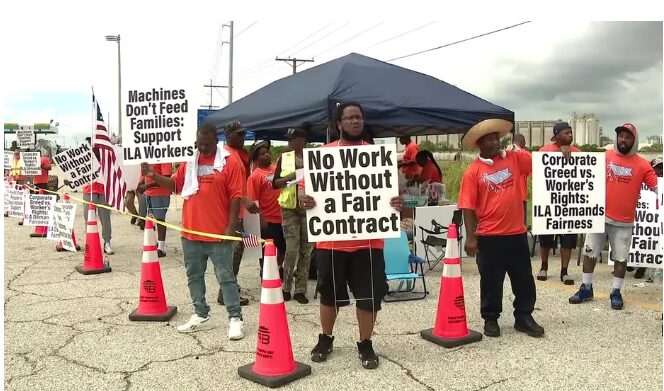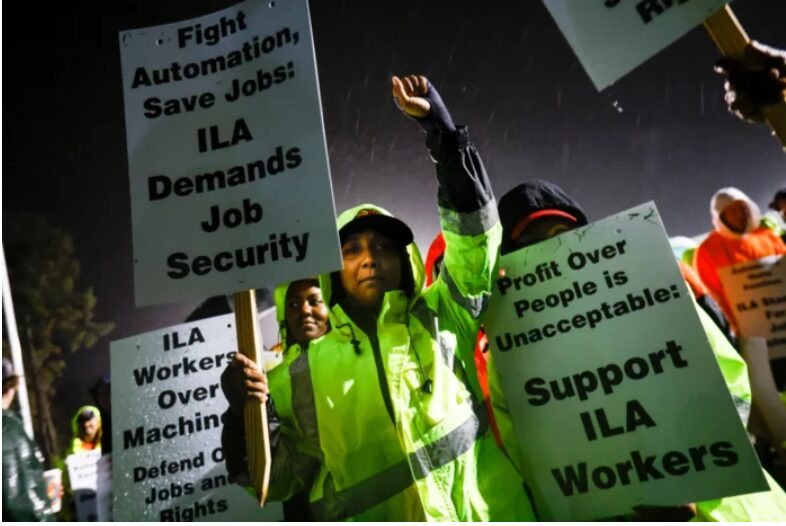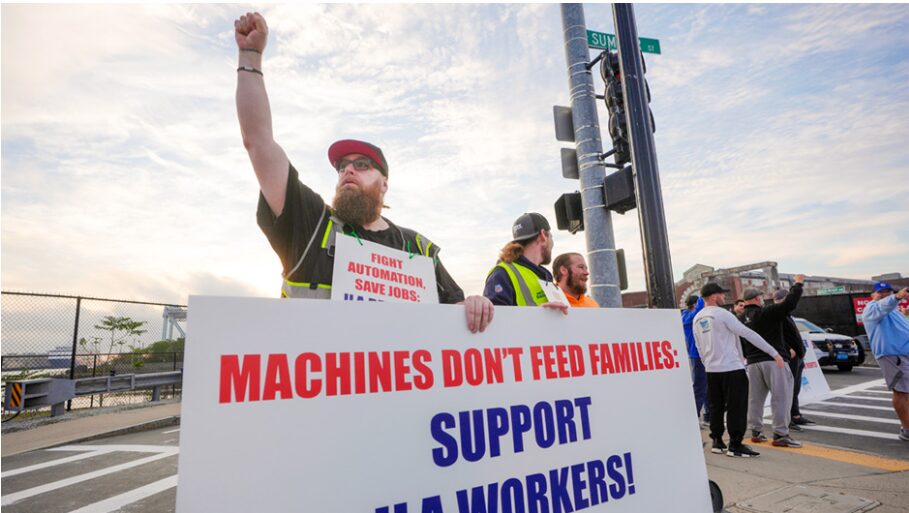
In a walkout over fair pay and automation, dock staff at ports across the eastern and southern coasts started setting up picket lines on early Tuesday morning. The International Longshoremen’s Association, which represents roughly 45,000 workers, had a contract that expired on Monday at midnight despite reports of progress in negotiations earlier that day. This is the union’s first strike since 1977, which has impacted approximately 36 ports from Maine to Texas. Upon announcement of the strike, public panic began to creep in as consumers worried over Covid-like purchasing conditions that led to barren shelves and items like toilet paper running scarce grocery stores across the U.S. Those conditions pointedly highlighted how essential workers are often overworked and underpaid, while also being underestimated as a vital part of the daily livelihoods of everyday Americans. This is why it doesn’t come as a surprise that although compensation has become a key factor in the union negotiation process, so has the fight against automation and worker replacement by artificial intelligence and technology.
As of Thursday, October 3rd, the strike has been suspended, but that does not mean that negotiations have come to a halt. The International Longshoremen’s Association and the U.S. Maritime Alliance reached a tentative agreement meant to expire January 15th. According to ABC News, the temporary agreement was mostly focused on wages, including a 62% increase over the life of the 6-year contract and a raise in hourly pay from $39 per hour to $63 per hour, but did little to address the issue of automation and job security. Negotiations will continue through January 15th with the hopes of no further disruptions.
Interruptions in the supply chain can be both alarming and confusing so it’s important to stay as informed and prepared as possible, especially in a world where misinformation can spread like California wildfires. Somewhere in between the politics and panic-driven propaganda is the truth, so it is important as journalists that we thread the needle to the facts. A prolonged government shutdown might have resulted in increased costs and shortages of products nationwide, so let’s clear the air about what probably would, and would not, be affected by another longshoreman strike.
While any port can handle any type of goods, some ports are specialized to handle goods for a particular industry. The ports affected by the shutdown included Baltimore and Brunswick, Georgia, the top two busiest auto ports; Philadelphia, which gives priority to fruits and vegetables; and New Orleans, which handles coffee, mainly from South America and Southeast Asia, as well as various chemicals and wood products from Mexico, Northern Europe, Asia, and South America. Customers most likely won’t notice any substantial shortages or price increases now that the strike has been suspended, but depending on what you were buying for, it might have been a different scenario if the shutdown had lasted longer than a month. Given the time of year of the walkout, the slightly good news is that there probably would have been some cushion because the majority of holiday retail goods have already arrived from overseas, but if it had continued, prices may have gone up on everything from fruits and vegetables to cars, from bananas to seafood to alcohol, at least for a while. This is why it’s even more imperative that negotiations are resolved by January 15th. The other collateral that comes with launching a labor strike in the fall is that a disruption is supply lines could have been politically harmful with Election Day just a month away.

Although many Americans flocked to hoard toilet tissue, paper products were not one of the imports that would have been affected. The American Forest and Paper Association, which represents companies that manufacture paper towels, toilet paper, facial tissues, and other wood products, stated that it was unaware of any effects the strike may have had on the supply of tissue products in the United States. The trade association claimed that around 85% of the tissues, paper towels, napkins, and toilet paper used in the United States are produced domestically and were unaffected by the walkout. The organization claimed that it took action after noticing social media posts about people stockpiling toilet paper. It’s a typical response to emergencies; similar to the early stages of the COVID-19 pandemic, where shoppers also stockpiled toilet paper.
Under Executive Order, President Biden could have invoked the Taft-Hartley Act of 1947, also known as the Labor Management Relations Act, which restricts the activities and powers of labor unions, but he didn’t think it was necessary and fortunately, temporary agreements were able to be met swiftly. The last time the Act was enforced was in 2002 under the George W. Bush administration amidst a West Coast port workers strike lasting 11 days.
Fair compensation is a pillar of the American dream and situations like this are exactly why labor unions exist. These are the workers who hold this country up, and we have seen how everything can fall apart without them. The United States would not be great without the everyday Americans who keep it running at its core. We can’t be the best if we don’t do better.








